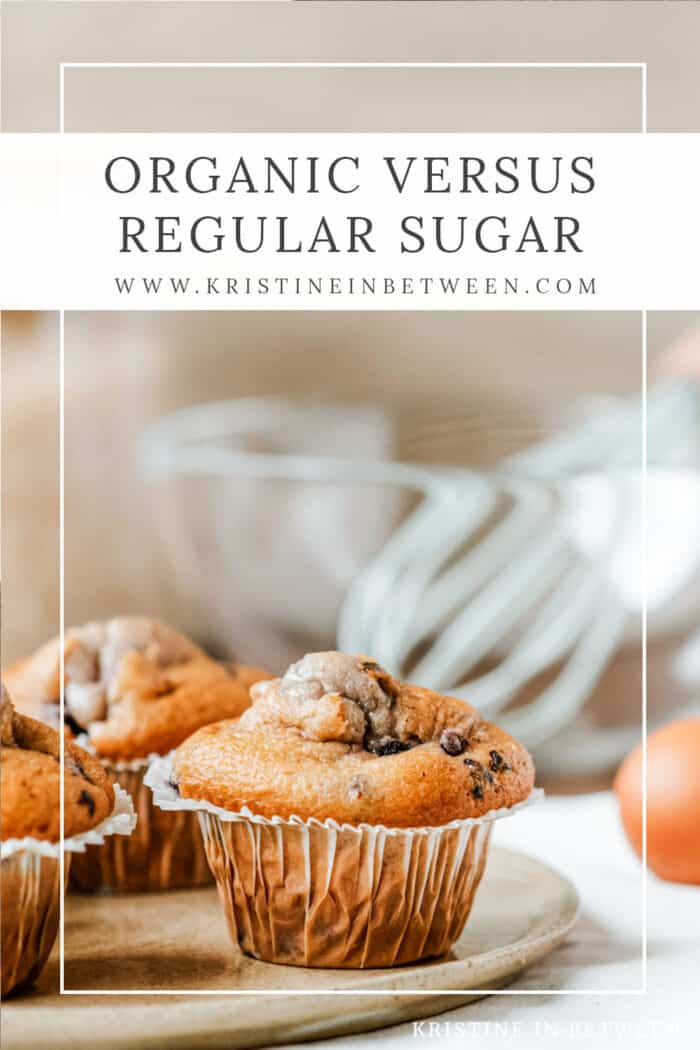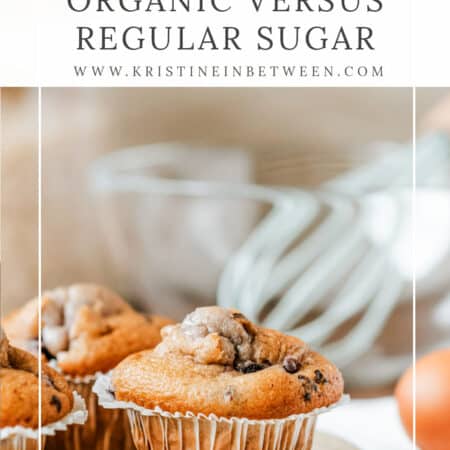Organic Sugar Versus Regular Sugar
This post contains affiliate links and we make a small commission for purchases made using these links.
Alright, my baking friends. Grab a cup of coffee, a muffin, and a comfy seat. Today, we’re discussing something very important – sugar. Mostly I want to talk about the difference between organic sugar and its regular refined counterpart, and what that means for us in the kitchen.
So, What Sets Organic Sugar Apart?
First things first, what makes sugar “organic”? Organic sugar is derived from sugar cane or sugar beets that have been grown without synthetic pesticides, herbicides, or GMOs. This means the sugar is as close to its natural state as possible. And you can tell, the granules are bigger, it’s darker in color, and it doesn’t cream as well.
On the flip side, regular sugar, often referred to as conventional sugar, might come from sugar cane or beets that were exposed to synthetic chemicals during cultivation. It’s your classic, run-of-the-mill sweetener found in most kitchens and it’s been around since the 18th century.

download our free
Meal Planner & Grocery List
dinner made easy

Do you love this post?
Share it on Pinterest
The Differences in Taste and Texture
Now, let’s talk about flavor. Organic sugar has been said to have a richer, more complex taste compared to plain regular sugar. I would describe it as a subtle molasses undertone that could add depth to your baked goods. Regular sugar, while still sweet, is lacking a deeper flavor profile.
But does this flavor distinction really matter in your chocolate chip cookies or morning muffins? Well, that depends on your taste buds I suppose. Some bakers swear by the distinct taste of organic sugar, claiming it elevates their recipes to a whole new level. Others argue that the flavor difference is too subtle to notice in most baked goods. I’m not entirely sure where I fall, yet.
Texture-wise, both sugars behave similarly in recipes, dissolving into your batters and doughs to create that irresistible sweetness. However, some bakers note that organic sugar tends to have larger crystals, which could impact the texture of your final product. More on that later.
Do You Need to Adjust Your Recipe?
One burning question many bakers have is whether they need to tweak their measurements when making the switch from regular to organic sugar. The short answer? Not necessarily. The sweetness level of both sugars is pretty much the same, so you can generally use them interchangeably without altering the quantity.
However, remember the larger crystals in organic sugar I mentioned earlier? Well, this could affect the texture of your baked goods, especially in recipes where sugar plays a structural role. For delicate pastries or light-as-air cakes, you might want to stick to regular sugar to ensure a consistently smooth texture.
I’ve been experimenting with my cookies and muffins and aside from the organic sugar not creaming as smoothly, I haven’t noticed a huge difference (which is a good thing because Jay bought me the HUGE bags of organic sugar from Costco to use).
Pros and Cons:
Let’s break down the pros and cons of each sugar variety to help you decide which one deserves a spot in your pantry (or maybe even both?).
Organic Sugar:
Pros:
- Environmentally Friendly: Grown without synthetic chemicals, organic sugar production is generally considered more environmentally sustainable.
- Complex Flavor: If you’re a flavor aficionado, the taste of organic sugar might be a game-changer in your recipes.
Cons:
- Price Tag: Organic sugar often comes with a higher price tag, making it less budget-friendly for some bakers.
- Texture Challenges: The larger crystals may impact the texture of certain baked goods and don’t cream as well.
Regular Sugar:
Pros:
- Cost-Effective: Regular sugar is widely available and tends to be more affordable than its organic counterpart.
- Versatility: It dissolves easily and works well in a variety of recipes, from cookies to custards.
Cons:
- Synthetic Additives: The cultivation process may involve synthetic pesticides and chemicals, which might be a concern for some.
So, in the grand scheme of things, whether you choose organic or regular sugar largely depends on your personal preferences and baking goals. If you’re all about embracing the natural and savoring subtle flavors, organic sugar might be your go-to. On the other hand, if you value affordability and versatility, regular sugar always has your back.
Remember, the beauty of baking lies in experimentation though, my friends. So why not try both and see which one works the best for you?



I was wondering about this. I’ve always been too afraid to make the switch in a recipe. I’m not a great baker, so I try to follow the recipe exactly. Maybe I’ll try organic next time. Thanks.
Hi Shelly! I feel this, I have been too. It looks very different so I assumed it would behave very different, but the truth is, in everyday baking it works great. Give it a go and let me know what you think. Happy baking!
This is such a great guide. Thanks for explaining the differences, so helpful!
Hey Tayler! You bet, my friend. Glad you found it useful. Happy baking!
This article is so helpful! I definitely try to cut out regular sugar when I can. Thanks for sharing!
Thank you so much, Holley! I’m glad you found it helpful 🙂
This was very informative. Thanks!
So glad to hear it, Ann! I appreciate the feedback very much.
How interesting – I know the distinction between say demerara sugar/muscovado and “regular” but didn’t really think of there being a difference with growing organically per se. Must do some trying and experimenting, thanks for sharing!
You bet Caroline, caring is sharing! Happy baking (and experimenting).
I have never really given the differences in sugars any thought, that is, until now! I am excited to try bake with organic sugar; I love that it doesn’t have any pesticides or other unnecessary ingredients!
Right, Sara? And for the most part, you can use it interchangeably in everyday baking. I haven’t really noticed much difference, outside of the way it creams in cookies. I love using organic sugar for sprinkling too because the granules are larger.